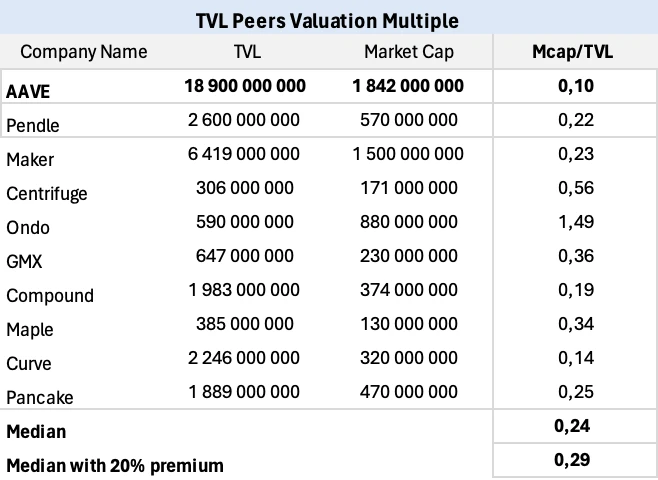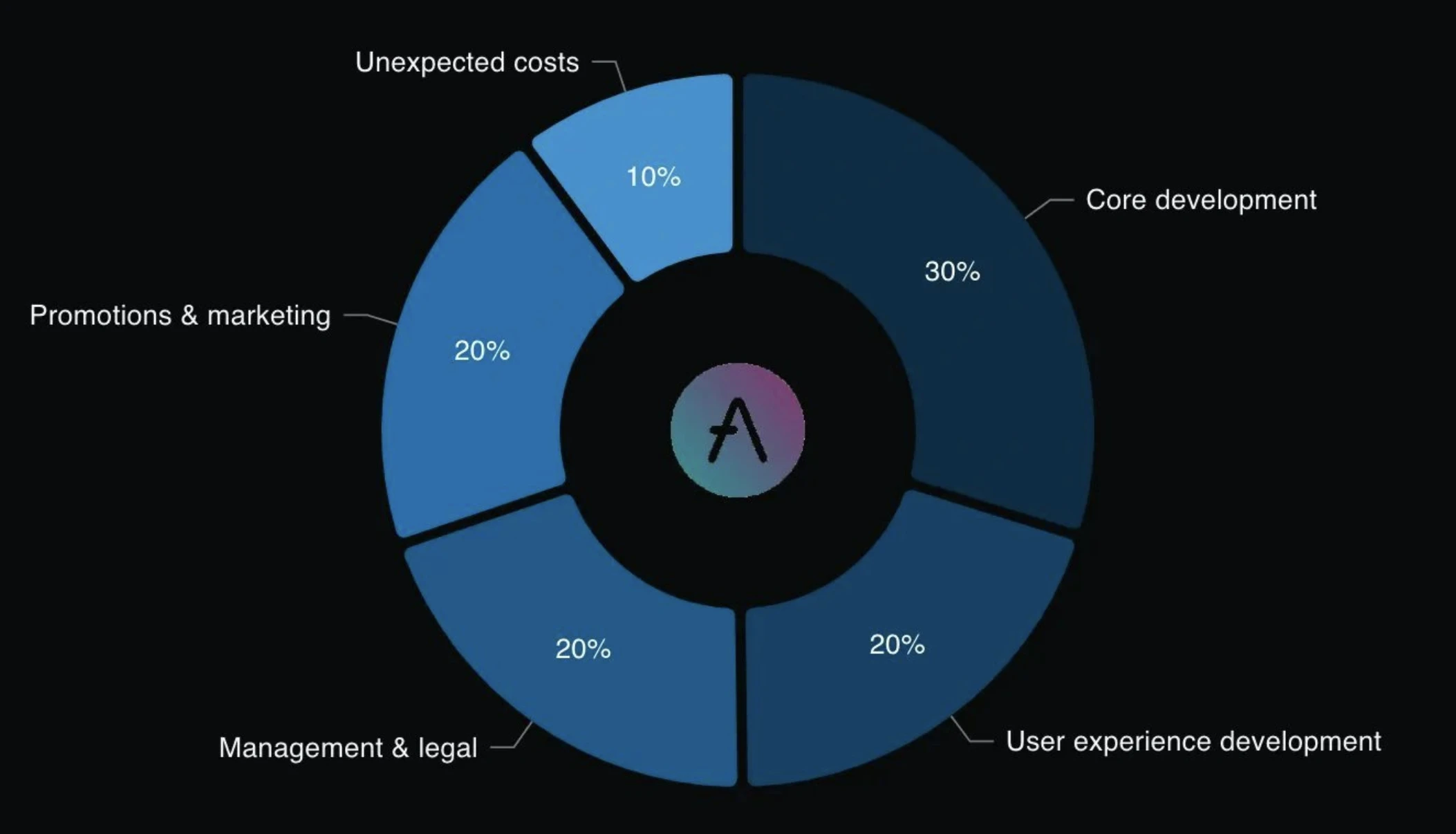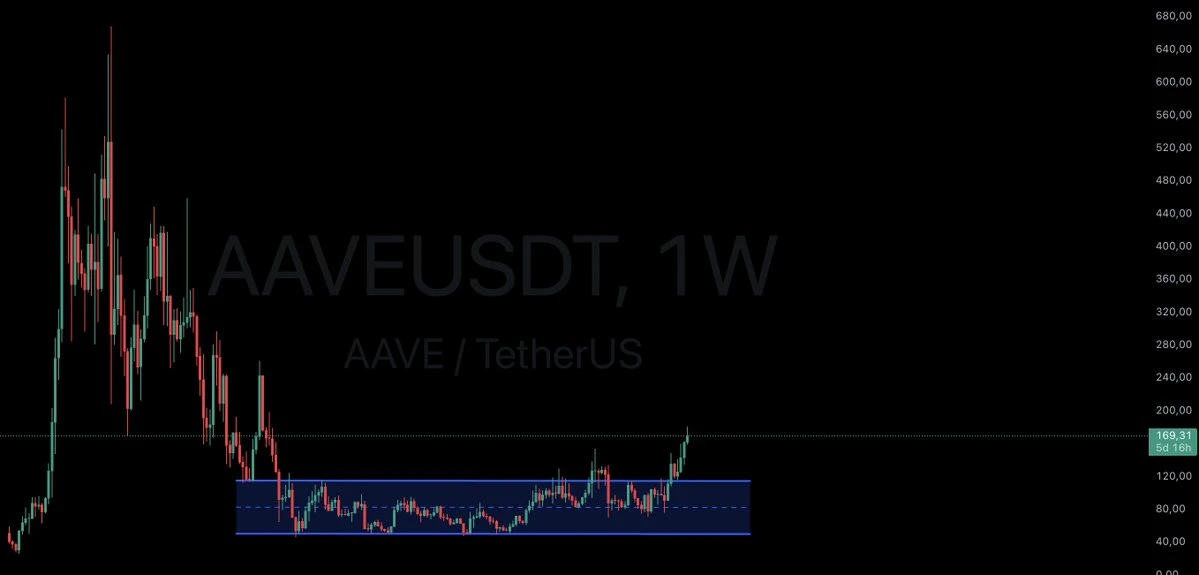تضاعف سعر العملة، وعادت TVL، وقمنا بإعادة تحليل Aave، الزعيم القديم الذي تولى زمام المبادرة في التعافي
Original author | Green Light Capital
Compiled بواسطة Odaily Planet Daily ( @OdailyChine )
Translator |Azuma ( @ازوما_ايث )
ملاحظة المحرر: Lending leader Aave (AAVE) has gone against the trend independently of the weak performance of the sector in the past few months. While the tokens of a number of old DeFi protocols continue to lie down, the price of AAVE has quietly doubled – from around US$80 on August 5 to above US$170 today.
As the Federal Reserve officially enters a rate cut cycle, discussions about the return of the altcoin season, especially the call for DeFi to rise again, have become increasingly louder, and Aave seems to have taken the lead in recovery. In the following article, Green Light Capital re-analyzes Aaves current fundamentals from multiple dimensions, which may help investors clarify AAVEs current rise logic and future trend expectations.
The following is the full text of Green Light Capital, translated by Odaily Planet Daily.
Why is it possible that AAVE will dominate this bull market?
The DeFi space can be intimidating at first glance, and it is often seen as the most difficult part of the Crypto industry to understand. It is also often seen as less attractive than the newest projects with innovative value propositions.
However, the opposite is actually true. Although interest in the DeFi space has declined following the collapse of Terra Luna and Celsius, a number of protocols are now offering some of the best investment opportunities in the industry.
Today, we will explore this topic further through our analysis of Aave, hoping that it can help you understand all the necessary information before making an investment decision.
Aave Overview (skip if familiar)
Aave started in 2017 (formerly ETHLend) and quickly developed into a leading project in the DeFi field. As a lending platform, Aave mainly provides a trustless, transparent and secure traditional financial proposal solution.
°How does it work? ”
For 80% of Aeve users, the protocol is primarily used to provide liquidity, where they connect their wallets, deposit ETH, stablecoins, or other crypto assets, and earn interest on those deposits. Most users end their journey here, with earnings coming entirely from borrowers who borrow assets — in return for borrowing, borrowers pay interest. The interest is redistributed to all depositors after deducting a fee called the “reserve factor,” which goes to Aave DAO.
To borrow assets on Aave, users must post collateral. Typically, borrowers deposit assets such as BTC, WBTC, or ETH, or deposit assets related to ETH, such as stETH or $WETH, while borrowing stablecoins. When users expect the value of BTC or ETH to rise, they are more inclined to adopt this strategy because it allows them to repay the loan at a lower cost. However, if the value of the collateral drops sharply due to unexpected market events and is no longer sufficient to cover the debt, liquidation occurs. In this case, the liquidator repays the debt on behalf of the borrower in exchange for a portion of the collateral as a reward. This liquidation process protects the entire protocol while ensuring the safety of the assets of liquidity providers.
Considering that liquidators may not be able to cover all losses, Aave has also set up a safety module consisting of $500 million worth of AAVE tokens. The module is supported by users who voluntarily pledge their own AAVE or provide liquidity in AAVE and ETH in return for safe behavior incentives. These users will act as a second line of defense to protect the protocol in black swan events.
AAVE’s Key Catalysts
In this section, we will look at key catalysts that are expected to help AAVE outperform other altcoins in the current cycle.
Catalyst 1: Paradigm Shift — Stakers Share Protocol Revenue
On July 25, 2024, Marc Zeller (Head of Aave Integration) proposed a proposal called AAVEnomics Update to implement a buy and distribute plan. The plan hopes to use the excess revenue of the protocol to directly reward DAO participants. This marks a major shift in AAVEs token economics, which will enhance the appeal of AAVE by providing tangible financial benefits to holders.
Interested readers can learn about this governance proposal that could revolutionize everything for AAVE through this article: https://x.com/GL_Capital_/status/1836746881797394641
Catalyst 2: Partnership with BlackRock
Aave has proposed integrating BlackRock’s tokenized fund BUIDL into its GHO Stablecoin Module (GSM).
The program aims to improve capital efficiency by using idle USDC to mint BUIDL, which is managed by BlackRock and backed by physical assets such as U.S. Treasuries and cash. This will not only enhance GHOs reserve management capabilities, but also increase liquidity within the Aave ecosystem. BUIDL tokens generate dividends every day, providing participants with stable returns, while also diversifying Aaves revenue sources – increasing RWA exposure.
In addition, this integration can also utilize the $100 million USDC redemption fund supported by Circle to achieve seamless exchange between GHO and USDC, thereby more effectively responding to market demand fluctuations and improving the stability of GHO.
By partnering with global financial giant BlackRock, Aave can not only strengthen its reputation, but also reposition itself as a pioneer in the integration of traditional finance and DeFi, opening the door to future institutional cooperation.
The collaboration also played a key role in achieving the key milestones required for Aave’s revenue distribution proposal:
-
GHO supply needs to reach 175 million: By utilizing idle USDC to mint BUIDL, the increased yield increases the demand for GHO and increases the possibility of GHO exceeding 175 million circulating supply.
-
Absorbing large GHO sales with minimal slippage: The USDC redemption fund ensures that large GHO sales (such as $10 million in redemptions) can be achieved with minimal slippage (1% price impact), maintaining the stability of GHO.
Catalyst 3: Entering Solana
Aave has been hinting at expansion to Solana for months.
Marc Zeller has mentioned that his role is to help Aave DAO maximize profits, which means they must operate flexibly and explore various ways to increase protocol revenue. Aaves view on Solana has changed since the FTX debacle. As a data-driven platform, Aave will only propose a migration plan if the potential revenue on Solana exceeds the cost of code modifications and security audits.
At present, the potential income on Solana is not enough to justify the migration, but Marc pointed out that the situation is gradually improving and Solana is becoming more and more attractive. Aave is watching its development.
Aave believes that expanding to Solana will not be difficult, and with their influence, they can quickly establish a leading position on the network.
Catalyst 4: Leadership and brand reputation
Over the past few years, DeFi users and the broader crypto community have become increasingly risk-averse due to events such as the FTX and Terra Luna collapses, multiple hacks of DeFi protocols, and ongoing wallet thefts.
As a result, it is becoming increasingly difficult for users to trust decentralized DeFi protocols to manage their assets. In this ecosystem, brand reputation plays the most critical role in gaining investor trust. This is where Aaves biggest advantage lies, and why we believe it will be difficult for new protocols to surpass Aave in the coming years. Aave has been an important part of the DeFi ecosystem since 2017, and while it has had some minor security incidents, they were mainly related to issues with external smart contracts or liquidity pools, and it has never suffered a major hack that directly endangered its core protocol. Aave has been proactive in addressing security issues, has conducted multiple audits, and has been running a bug bounty program to incentivize vulnerability identification.
As a result, Aave is considered one of the safest DeFi platforms, and its customers are mainly whales who want to earn attractive returns while lending their funds. These whales prioritize security and are unlikely to move their assets to newer, lesser, and less battle-tested protocols just to get slightly higher returns. As more and more institutional players enter DeFi, Aave is well-positioned to maintain its leadership.
With a 67% market share in the lending space, Aave is expected to continue to strengthen its dominance in the coming years, solidifying its position as a market leader.
سوق Prospect Analysis
As you know, borrowing on Aave requires depositing collateral. Therefore, we have been looking for lending models in traditional finance that are consistent with Aaves business in order to make comparisons and highlight the huge growth potential of DeFi in the coming years.
In our analysis, margin loans appear to be the most similar to Aave’s lending model, as they allow stock market investors to borrow money to buy more stocks/securities using existing assets as collateral.
On Aave, borrowers are typically individuals who believe that the crypto market will continue to rise. They typically use assets such as BTC and ETH as collateral to borrow stablecoins to buy more cryptocurrencies. If the market rises, their borrowing costs become relatively small, allowing them to profit from their trades. However, if the market falls, they will also face margin calls and potential liquidation risks, which is similar to the risks faced by margin lending users in traditional finance.
When analyzing active loans in DeFi more closely, it is clear that the sector is recovering and is on track to return to its all-time highs (ATH) of around $20 billion last seen in 2021. Currently, there are $11 billion in active loans within the crypto space, with $7.4 billion of that coming from the Aave protocol, further highlighting its dominance of the market. However, compared to the current total of $800 billion in margin lending in traditional finance (a whopping 80x difference), it is clear that the crypto lending market has a lot of room to grow in the coming years.
Valuation comparison
The best way to assess whether an asset is overvalued or undervalued is to compare it to other assets using key metrics like market cap/TVL multiples. We performed this analysis a few weeks ago and the results showed that AAVE is currently significantly undervalued.
In this post ( https://x.com/GL_Capital_/status/1834180379583877447 ), you can also find our price and market capitalization forecasts for the next 12 months.
رمز مميز النموذج الاقتصادي
Aaves token was first launched under the name LEND during the ETHLend era. In 2020, Aave introduced a token swap that significantly reduced the maximum supply of tokens.
Through this swap, holders will be able to exchange 100 LEND tokens for 1 AAVE token, reducing the total supply from 1.3 billion LEND to 13 million AAVE. In addition, the team has allocated an additional 3 million tokens to the Aave ecosystem reserve to support protocol development.
The migration from LEND to AAVE marked the introduction of an internal governance mechanism to the protocol, allowing the community to submit Aave Improvement Proposals (AIPs) and participate in the development of the project. Governance has thus become the core utility of the AAVE token.
The initial distribution structure of AAVE tokens is as follows.
Financing and unlocking status
In 2017, the Aave team conducted an initial coin offering (IC0) and raised $16.2 million from investors at a price of $0.0184 per LEND token (equivalent to $1.84 per AAVE token). As of today, investors in that round have received a 78x return on their investment, and during AAVEs all-time high (ATH), the return rate was as high as 360x. However, given that this was 7 years ago, it is unlikely that many initial investors still hold their tokens.
Aave also completed several funding rounds during the 2020 token swap. These funding rounds mainly involved selling tokens from the Aave treasury and raised $32 million in funds. Unfortunately, the specific details about these funding rounds (such as unlocking schedules) have not yet been disclosed. It is speculated that most VCs may have sold their positions during the 2021 bull run, so the risk of these institutions selling AAVE on a large scale again is not high.
From the unlocking status, the current circulating supply of AAVE is 14.9 million, accounting for the vast majority of the total supply of 16 million tokens. In addition, there are about 1 million tokens remaining in the treasury for staking rewards for the security module and to provide incentives for liquidity providers. Since most AAVE tokens are already in circulation, there will be no large-scale token unlocking in the future, which ensures that AAVE will not suffer a large value dilution.
This is the optimal token structure, where almost all tokens are already in circulation.
فائدة الرمز المميز
At present, the uses of AAVE tokens are relatively limited and can be roughly summarized into two main aspects. The first is governance utility. AAVE holders can vote on proposals or initiate new proposals (AIPs), which can affect the risk parameters, incentives, product improvements and upgrades of the protocol; the second is staking utility. AAVE holders can choose to allocate tokens to the security module. When a black swan event occurs, the staked tokens will be cut by the protocol to repay the remaining debt to protect the assets of liquidity providers. In return for protecting the security of the protocol, AAVE stakers will receive corresponding incentives.
As the new revenue distribution proposal progresses, the utility of AAVE will also change. The most significant change is that the current security module will transition to a legacy security module, which means that the existing system – where staked AAVE can be cut in extreme cases to make up for protocol deficits – will evolve into a more efficient and user-friendly model.
Under the new model, the staking mechanism for AAVE tokens will be decoupled from protocol security responsibilities. AAVE holders can still stake their tokens to receive revenue rewards, but these rewards will be directly tied to the protocols revenue and no longer associated with protocol risk. This means that the risk of staking losses due to protocol security incidents will be eliminated, making staking more attractive to token holders.
K-line analysis
From a technical perspective, AAVE’s prospects for the coming months look attractive, especially considering its strong performance relative to BTC and ETH in recent weeks.
When analyzing the AAVE/ETH trading pair, we observe that the trend on the weekly timeframe has changed significantly. AAVE has managed to make a new high, which indicates a potential trend reversal or suggests that the bear market-related downtrend may be behind us. In our opinion, the bottom of AAVE relative to ETH has most likely been established.
When analyzing AAVE’s performance individually, we can see that the token has finally broken out of the weekly range it has been in since May 2022. The token appears to be regaining strength and attracting more investor interest, especially after the announcement of the distribution of excess revenue to token holders.
After such a long accumulation period, we expect AAVE to quickly re-price and subsequently enter an aggressive upward trend.
Investment Notes
Based on our analysis, AAVE seems to be an obvious choice in the current bull run. The new revenue distribution plan completely changes AAVEs value capture ability by aligning the interests of token holders with the earnings of the Aave protocol.
The lending market in DeFi is still small, but it may experience significant growth in the coming years, especially as more institutional players gradually enter the market. With its strong brand reputation and leading position, Aave is able to absorb this new influx of funds and is expected to expand horizontally to more new markets (such as Solana).
Additionally, by comparing the “Market Cap/TVL” ratio, it can be seen that despite AAVE’s recent significant growth, its price is still undervalued.
AAVE has recently broken out of a one-year trading range, and given its current undervalued status, we expect the market to reprice it soon.
This article is sourced from the internet: The price of the coin doubled, TVL returned, and we re-analyzed Aave, the old leader that took the lead in recovery
Related: AVAX Trust pushes AVAX up 10%. Has Grayscale Fund become an investment indicator?
Original | Odaily Planet Daily ( @OdailyChina ) Author | Fu Howe ( @vincent 31515173 ) Last night, Grayscale announced the launch of the Grayscale Avalanche Trust, which provides qualified investors with investment opportunities in the cryptocurrency AVAX. As soon as the news came out, AVAX rose, with an increase of more than 5% in 1 hour; as of press time today, the 24-hour increase exceeded 10%, temporarily reported at 25.7 USDT. In fact, in the past half month, AVAX has stabilized at the bottom and started to rebound. Its price fell to a near 9-month low of 17.29 USDT on August 5, and rose to a high of 26.6 USDT, an increase of more than 45% in two weeks. In addition to the Grayscale AVAX Trust news, global asset…














